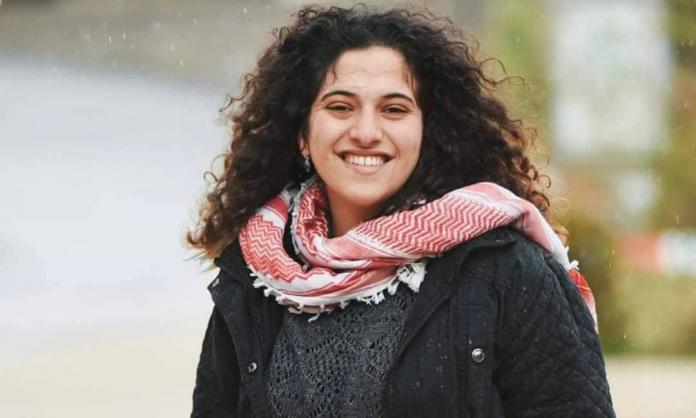Layan Kayed, a student activist at Birzeit University in the West Bank, was arrested in the early hours of 7 June by Israeli occupation forces. Kayed has previously spent sixteen months in Israeli prisons for her student activism in support of Palestinian liberation.
According to prisoner support and human rights association Addameer, Kayed’s phone and laptop were stolen during the raid of her Ramallah home. The Ofer Military Court then ordered her detention for eight days with no access to a lawyer.
A statement by the Palestinian Youth Movement (PYM) noted that the targeting of Kayed, and other student activists, “indicates that the student movement continues to play a critical role in the Palestinian national struggle”.
According to the PYM, Palestinian student organisers have come under attack from occupation forces “to deny students the right to form democratic structures and collective power which naturally threaten [the occupation’s] own illegitimate power”.
Addressing a session of this year’s Melbourne Marxism Conference via Zoom, Kayed explained that students at Birzeit University had engaged in all kinds of activism, including sit-ins and protests, focusing on illegal settlements, military checkpoints and other manifestations of the 56-year-long occupation of the West Bank. Many have been arrested; some have been killed by occupation forces.
Kayed’s arrest comes amid a wave of repression. More than 400 Palestinians, including 52 children, were detained in May, according to the Palestinian Centre for Prisoners Studies. There are nearly 5,000 Palestinian political prisoners in Israeli jails, including 1,200 in administrative detention (without trial).
While Israeli settlers in the West Bank are subject to civilian law, Palestinians are subject to military law. Military courts can prosecute children as young as 12 for crimes such as “stone throwing”. Ninety-five percent of military court cases result in convictions, according to Military Court Watch.
There has also been a significant escalation in deadly attacks by both occupation forces and Israeli settlers. So far this year, at least 125 Palestinians, including at least 20 children, have been killed in the West Bank, including East Jerusalem, according to the Palestinian Ministry of Health. More than 4,000 have been injured.
Hebrew newspaper Maariv reported on 2 June that Israeli military institutions are preparing for a potentially large-scale military offensive to “purge” the occupied West Bank of armed Palestinian resistance.
Alongside Israel’s ultranationalist government’s military operations are other moves to consolidate a de facto annexation of the West Bank. Finance minister Bezalel Smotrich, leader of the Religious Zionist Party, has been tasked with heading a new settlement authority. This will enable him to determine who can build homes, schools and public infrastructure, and which communities can be demolished.
Smotrich has a history of anti-Palestinian racism. In February, he called for the West Bank village of Huwara to be “wiped out” amid a pogrom by Zionist settlers. And in March, he told a meeting in Paris: “There is no such thing as Palestinians because there is no such thing as a Palestinian people”.
Should Smotrich and his far-right ally, National Security Minister Ben-Gvir, get their way, the Zionist movement’s long-term ambition to annex the West Bank and “cleanse” it of Palestinians will accelerate rapidly.
However, Palestinian youth are rising. A resurgent resistance is developing across Palestine, centred in West Bank towns and villages and in East Jerusalem. Student organisers such as Layan Kayed are at the forefront of this movement.
Building international solidarity with the Palestinian resistance—and demanding an end to our own government’s support for Israel—is critical to turning the tide.
Free Layan! Free all Palestinian political prisoners!










